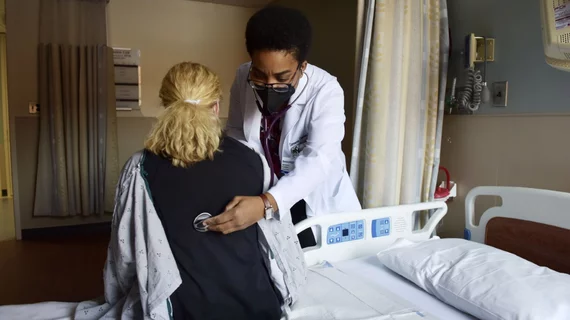What new research tells us about the significant heart damage associated with COVID-19
Researchers have uncovered new data on how, exactly, COVID-19 is able to cause so much damage to a patient’s heart. The team shared its findings at the American Heart Association’s Basic Cardiovascular Sciences Scientific Sessions 2022 in Chicago.
“It’s already known from the clinical side that COVID-19 infection can induce heart injury, however, what we don’t know is the mechanistic details of how this occurs,” lead author Zhiqiang Lin, PhD, an assistant professor at the Masonic Medical Research Institute in Utica, New York, said in a statement.
The research by Lin et al. was largely focused on the spike protein associated with the severe acute respiratory syndrome coronavirus 2 (SARS-CoV-2) virus. This protein, found on the surface of SARS-CoV-2, can latch onto healthy cells in a person’s lungs, heart and other organs, leading to infection. When the spike protein latches onto heart cells, triggering the body’s natural immune response, it can lead to significant heart damage.
Lin’s group cloned the SARS-CoV-2 spike protein as well as the spike protein associated with a separate coronavirus, HCoV-NL63, activating them both in mice models. The SARS-CoV-2 spike protein led to heart dysfunction, hypertrophic remodeling and cardiac inflammation, but the NL63 spike protein did not. A separate test, performed in dishes within the team’s lab, confirmed that the SARS-CoV-2 spike protein makes heart muscle cells larger than normal.
“We found direct evidence that the SARS-CoV-2 spike protein is toxic to heart muscle cells,” Lin said.
The researchers also evaluated a heart biopsy from a patient who had died with COVID-related inflammation, noting that both the SARS-CoV-2 spike protein and TLR4 proteins were present. Neither protein is typically found in a healthy human heart.
“That means once the heart is infected with SARS-CoV-2, it will activate the TLR4 signaling,” Lin added. “Besides directly damaging the heart muscle cells, the spike protein itself is very inflammatory and may cause systemic inflammation that indirectly causes heart problems.”
The statement highlighting these latest findings emphasized the continued importance of COVID-19 vaccines.
More information on Basic Cardiovascular Sciences Scientific Sessions 2022, a four-day conference in Chicago, is available here.

